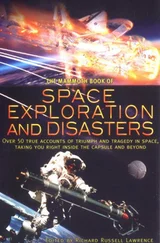“Why are we closing off Spektr? It’s the wrong module to close off. If we’re gonna do a leak-isolation thing, we have to start with Kvant 2.”
Foale was about to say more, when Lazutkin cut him off.
“Michael,” he said, “I saw it hit Spektr.”
And with that Foale at last fathomed Lazutkin’s urgency: seal Spektr, and they save the station.
It took almost three minutes for Lazutkin to tear apart fifteen of the eighteen cables. The remaining three cables didn’t have any visible connection points. They were solid and unbreakable. Lazutkin thought of the knife. He retrieved it from his pocket and slashed a thin data cable for one of the NASA experiments. The next moment he slashed a leftover French data cable from one of the Euro-Mir missions. One cable remained. One cable whose removal would allow them to seal the hatch and save the station.
But Lazutkin received a rude shock when he began sawing into the last and thickest of the three cables. Sparks flew up into his face. It was a power cable.
Foale saw a frightened look cross the Russian’s face.
“Sasha, go ahead!” Foale urged. “Cut it!” A beat. “Cut it!”
But he wouldn’t. He wouldn’t cut it.
At the moment the Progress struck the station, Mir was just coming into communications range of TsUP. Burrough:
It was at this point that Tsibliyev, still floating anxiously at the command center in base block, heard the TsUP hailing him. Nikolai Nikiforov, the shift flight director, was at the command console in the TsUP. Vladimir Solovyov stood out of sight in a separate control room used for Progress operations. There was static, and for a moment Tsibliyev’s words could not be heard.
“Siriuses!” Nikiforov shouted. “Siriuses!”
Suddenly Tsibliyev’s voice broke through the static. “Yes, yes, we copy! There was no braking. There was no braking. It just stalled. I didn’t manage to turn the ship away. Everything was going on fine, but then, God knows why, it started to accelerate and run into module O, damaged the solar panel. It started to [accelerate], then the station got depressurized. Right now the pressure inside the station is at 700.”
Sirius was Mir’s codename. Module O was Spektr.
Soloyov, immediately realizing what had happened, got on comm. Burrough:
“Guys, where are you now?”
“We are getting into the [Soyuz]…”
Chaos broke out for several moments on the floor of the TsUP as Solovyov and the other controllers tried to determine exactly what was happening aboard the station. The comm broke up for a moment.
“Copy, damn it!” Solovyov barked.
“Oh, hell,” Tsibliyev blurted out. “We don’t know where the leak is.”
“Can you close any hatch?” interjected Nikiforov.
“We can’t close anything,” Tsibliyev said hurriedly. “Here everything is so screwed up that we can’t close anything.”
As Tsibliyev’s words crackled over the auditorium loudspeakers, Keith Zimmerman couldn’t understand anything the commander was saying: he spoke very little Russian. Then, suddenly, his interpreter said, “They hit something.”
Zimmerman wrinkled his brow. “What do you mean?” he said. From the interpreter’s even tone of voice, he guessed that maybe one of the cosmonauts had hit his thumb with a hammer.
“The Progress,” Aleksandr said quietly. “It hit the station. The pressure’s going down.”
Zimmerman went numb. This was not something a 29-year-old MOD assistant was accustomed to hearing.
“Wait, Vasya, what are you doing now?” Nikiforov asked.
“We are getting ready to leave. The pressure is already at 690. It continues to drop.”
“Can you switch on any blowers?”
“I think we can.”
“Open all existing oxygen tanks.”
“Sasha,” Tsibliyev hollered to Lazutkin, “have you closed the hatch?”
Lazutkin’s reply was drowned out as the station’s master alarm continued braying.
“Vasya,” said Solovyov, “what are you doing now?”
“DSD has turned on. We managed to close the hatch to module O.” This was wishful thinking: as Tsibliyev spoke, Lazutkin still hadn’t cleared the last cable from the hatch. DSD was a depressurization sensor.
“Module O. Has [the Progress] run into module O?”
“Yes, it hit module O.”
“Is the hatch closed right now?”
“Sasha is closing it right now.”
“What’s happening with the pressure?”
“DSD turned on when pressure dropped down to 690.”
Solovyov interjected. “Can you pass through [the node] right now? We should have extra [oxygen] tanks somewhere in TSO.”
“I know that,” said Tsibliyev. TSO refers to the air lock at the end of the Kvant 2 module.
Solovyov’s call for Tsibliyev to retrieve one of the station’s pumpkin-size oxygen cylinders was a standard response to depressurization scenarios in both Russian and American simulations; until this moment it had never been tried in an actual crisis. Releasing oxygen into the Mir’s atmosphere, Zimmerman realized, meant Solovyov had decided to begin “feeding the leak” – that is, replacing air that had already begun to whistle through whatever hole the Progress had poked in the hull of the Spektr module. Feeding the leak wouldn’t save the station, but it should give the crew precious extra minutes. How many depended on how fast the station was losing air.
“So open them up,” Solovyov ordered.
“I [will start] doing that right now. I am taking off the ears” – the headphones – “and am taking off to do that.”
“But someone has to stay here to maintain the connection!” Solovyov pleaded.
“Then I can’t make it.”
Tsibliyev did it anyway. Ripping off his headphones, he left his post, turned, and swam out over the command console and into the node.
“Guys?” Solovyov asked. “Someone pick up!”
There was no answer.
“Sasha?”
No answer.
“They have left… Guys? Someone respond.”
Lazutkin wouldn’t cut the power cable. Again he and Foale plunged down into the darkened morass of loose cords and equipment and lids and seals that lined the node walls. Somewhere in the chamber’s dim recesses, Lazutkin believed there must be a plug for the power cable. Foale ripped aside cable bundles and ran his hands over the walls. Lazutkin craned his head, looking, looking.
There. Lazutkin pulled at the power cable and followed it to a plug inside Spektr. With one furious yank, he ripped it from the wall.
Immediately Foale and Lazutkin turned to confront Spektr’s inner hatch. Lazutkin reached into the module and pulled on the hatch to close it.
It wouldn’t budge.
Both men instantly saw the problem. With the pressure dropping inside Spektr, all the air inside the station was rushing past them, seeking to escape through the unseen breach into open space. It was as if they were trying to close an open door while an invisible river surged through it. Lazutkin realized he could slip into Spektr and push from the inside, but then he would be trapped within the sealed module. He would die quickly, a hero of the motherland, but Sasha Lazutkin wasn’t ready to die yet.
Again he and Foale tugged at the hatch, straining to pull it closed.
It wouldn’t budge. Nothing they did would make it move a single inch.
They couldn’t close the hatch because of the air rushing through it. Tsibliyev dashed into Kvant 2 to get an oxygen cylinder. He turned it on and the pressure began to go up.
The hatch wouldn’t shut.
Its outer surface was smooth, with no easy handholds. Neither Foale nor Lazutkin could risk slipping his hands around the hatch’s outer edge, for fear of losing a finger.
“The lid! Let’s get a lid!” Lazutkin urged.
Читать дальше












